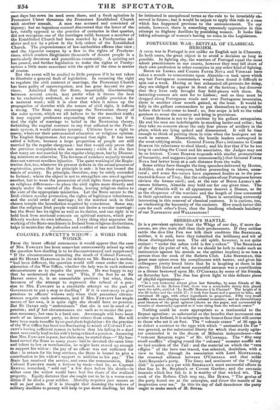COLONEL FAWCETT'S WIDOW : A WORD FOR WOMEN.
From the latest official statements it would appear that the case of Mrs. FAWCETT has been somewhat unnecessarily mixed up with the question bow duelling is to be discountenanced and suppressed. " If the circumstances attending the death of Colonel Fawcett," said Sir HENRY HARDINGE in the debate on Mr. BERNAL'S motion, "had been different, the question would still come under the con- sideration of the War Office, whether the lady was in such reduced circumstances as to require the pension. He was happy to say that be understood she was not." This, if the fact be as Sir HENRY states it, is an unassailable position : but what, then, becomes of the attempt to represent the refusal of a pen- sion to Mrs. FAWCETT as a creditable attempt on the part of Government to put a stop to duelling? If it is customary to give pensions to officers widows only when their pecuniary circum- stances require such assistance, and if Mrs. FAWCETT has ample means of her own, it is quite right she should have no pension. But Sir Essay only " understands " that she is not in need of a pension ; and if her circumstances are such as to render the pen- sion necessary, her case is a hard one. An example will have been made of an innocent party, to deter others from crime. She will have been made tosuffer by ex-post-facto legislation : for the practice of the War Office has been too fluctuating to admit of Colonel FAW- csres having sufficient reason to believe that his falling in a duel must necessarily lead to his wife's being refused a pension. Assuming that Mrs. FAWCETT is poor, her claim may be stated thus—" My hus- band served the State so many years: had he devoted the same time and talent to law or merchandise, he might have stored up enough to support his widow : the pay of an officer was not sufficient for that : in return for his long services, the State is bound to give a contribution to his widow's support in addition to his pay." The State has received the service, and owes the remuneration. Had Colonel FAWCETT made a fortune by trade—had be, as Captain BERNAL remarked, " sold out " a few days before his death—in either case the widow would have had her share of the realized property. Equity dictates that she ought not to be in a worse con- dition if he died a poor soldier. Morality requires just means as well as just ends. If it is thought that dooming the widows of military duellists to penury will help to put down duelling, let this be intimated in unequivocal terms as the rule to be invariably ob- served in future; but it would be unjust to apply this rule in a case which has happened previous to the announcement. To our minds, however, there is something extremely oppressive in this attempt to frighten duellists by punishing women. It looks like taking advantage of women's having no voice in the Legislature.


























 Previous page
Previous page